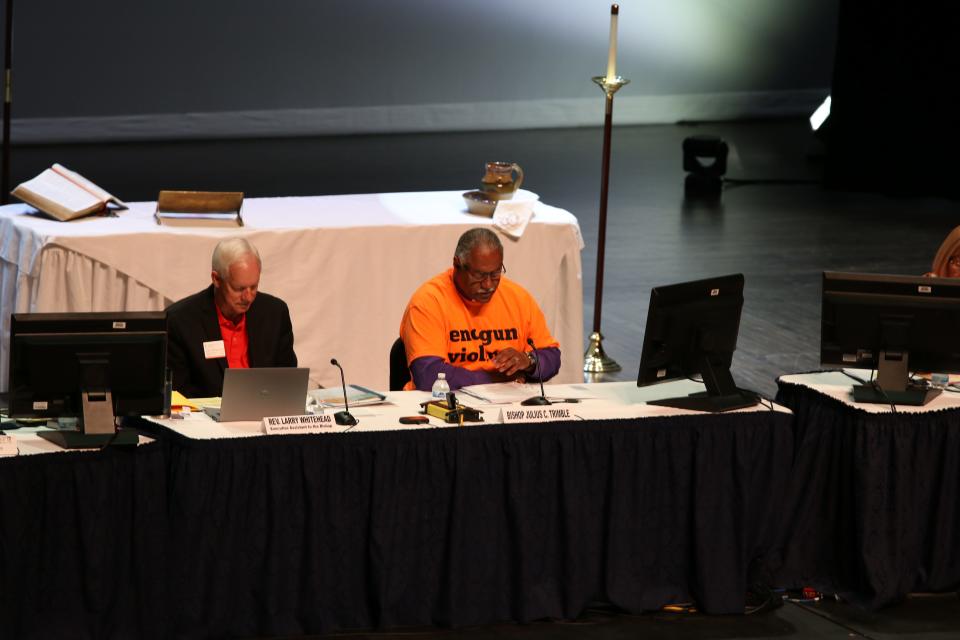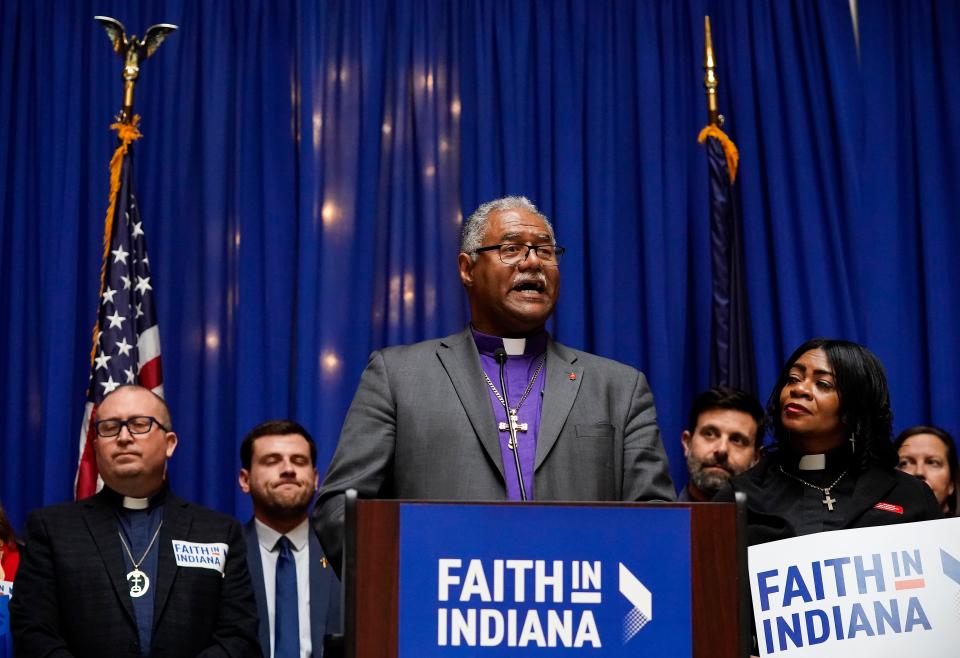UMC loses 174 Hoosier congregations at annual state conference in ongoing schism
MUNCIE, Ind. − United Methodist Churches of Indiana is perhaps more united but smaller after 174 congregations separated from the UMC Thursday night during the denomination's annual state conference held at Ball State University.
A schism persists between believers in traditional Methodist doctrine and those pressing for a more progressive faith that, among other issues, includes the acceptance of LGBTQ rights within the church. Another 107 traditional congregations left in November, meaning 284 community churches in Indiana have split from the UMC in the past eight months.

"We value Christian unity and believe that we can accomplish more together than we could apart," said Serena Acker, communications officer for the UMC in Indiana. "We will continue with our mission, no matter the number of churches we have. We remain hopeful for the future."
She said Indiana still has 675 UMC congregations.
More: Over 100 Indiana churches leave United Methodist Church as social issues wedge a divide
Under rules currently in place, United Methodist congregations at local churches may disaffiliate after paying two years of apportionments or annual fees paid for being part of the UMC organization. It also must pay into the pension plan for UNC clergy. Departing congregations can keep church buildings and real state under "Rule 2553," which expires at the end of 2023. It also allows for a majority vote by the conference to permit churches to leave.
During the Thursday evening proceedings, a lay member of the church asked Julius C. Trimble, the resident bishop for Indiana, if there would be another opportunity for congregations to separate this year.

Trimble said there would be no further disaffiliations under Rule 2553 this year, and he would leave the question of additional disaffiliations to a global UMC general conference planned for the spring of 2024.
"If you've been United Methodist all this time," Trimble said, adding departing members should be able to wait until next spring.
Emotions high as disaffiliation vote concluded
Tears flowed among many of the attendees as the vote concluded and Trimble recited a verse from the hymn "Blest Be the Tie That Binds" – When we asunder part, it gives us inward pain; but we shall still be joined in heart, and hope to meet again.
John Lomperis, who has been a United Methodist General Conference delegate from Indiana and a supporter of traditional church doctrine, said the spilt started becoming serious in 2019 when the global church voted narrowly to maintain traditional doctrine.

The leadership in the United States did not accept the decision, he said, and determined to go their own way. At that same conference, the provisions of Rule 2553 were adopted. Since then, including this week, Indiana has lost a third of its UMC churches, he said.
Cory Herrin, pastor of Fairlawn United Methodist Church, which has a small congregation in Evansville, said the rule to allow a simpler path to disaffiliate was put forward at the 2019 conference in anticipation the progressive would win and many conservative churches would choose to leave.
"The conservatives won," he said.
But many conservative churches are still leaving.
Herrin said Fairlawn is staying put for the time being.
"Until something changes, there is no need to," he said.
The pastor said his church is open to everybody and everyone is loved at Fairlawn.
Churches disaffiliating include:
Battle Ground UMC
Bowling Green UMC
Bunker Hill UMC
Crawfordsville Mount Zion UMC
Delphi United Methodist Church
Evansville Albright UMC
Greensboro UMC
Hartford City Grace UMC
Hartford City Trinity
Muncie Industry UMC
Muncie Fountain Square UMC
Richland Mount Zion UMC
Santa Claus UMC
Disagreements between liberal, conservative churches not new
While some UMC churches have welcomed openly gay pastors and performed same sex marriages, those practices remain officially outside the polity of the church, he said.
There have been disagreements between liberal and conservative churches for decades, he said, but issues surrounding the acceptance of people practicing gay lifestyles seemed to have triggered the schism.
"Human sexuality is a topic on which people of faith have differing and heartfelt views, and the Indiana Conference is no exception.," Acker said. "We have geographical, generational, and cultural differences in our Conference, and we consider that diversity to be one of our strengths."
Lomperis, who is also the United Methodist director at the Institute on Religion and Democracy, based in Washington, D.C., said homosexuality is not what is driving the split for traditionalists at UMC. Rather, it's about doctrine, scripture and to what degree the UMC will abide by biblical teachings.
Herrin said that he thinks there something of a libertarian spirit at the heart of church members choosing to disaffiliate. And he added that libertarians are often conservative these days.
"This is a dominate issue," Herrin said. "Churches want to have autonomy from the dictates of others."
But there is strength in numbers and Herrin said there are advantages in being part of the UMC, which Fairlawn has been it's entire existence for about a half century.
Lomperis said that as the more conservative congregations leave UMC, the progressive congregations are likely to gain in strength and make the progressive changes many anticipate.
Herrin said he would consider what that means for his congregation if that happens.
"I have shed tears," said Herrin about the UMC being torn apart. "It has been part of my prayer life daily."
Acker says "regardless of the number of churches that may disaffiliate," the Indiana Conference of the UMC will welcome people of all nations, ethnic groups, ages, and sexual orientations.
"That hasn’t changed," she said.
This article originally appeared on Muncie Star Press: UMC loses 174 Hoosier congregations at conference in ongoing schism

